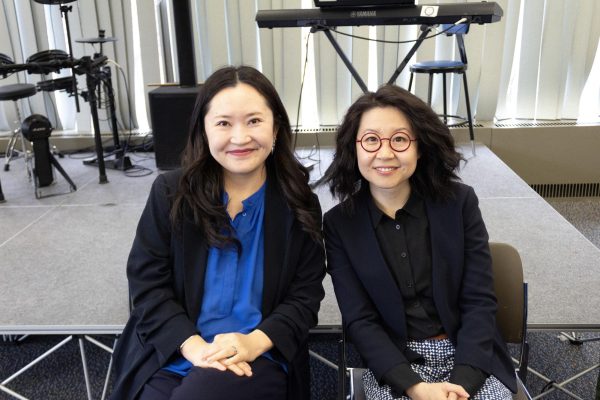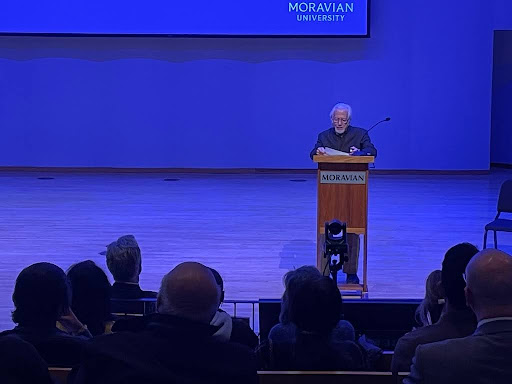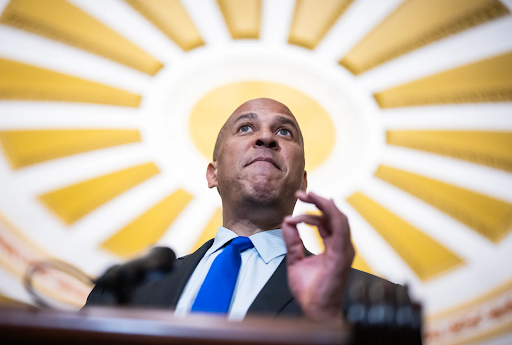Our Sit-Down with President Grigsby, Part I: COVID and the College
Now that we’re well into the Spring semester, I wanted to sit down with President Grigsby to catch up with him and get his take on the news around campus.
From the window of my dorm room on South Campus I have a perfect view of the President’s house. With him in his office at home only steps away from my dorm building, we decided to have a socially-distanced meeting on Zoom. How strange, I thought as I prepared for this interview, that the new normal way to conduct an interview is through a computer screen rather than face-to-face as it had always been.
During our 45-minute conversation, President Grigsby discussed many issues facing the college including Covid-19, academia, diversity, and the student experience. Below is the first of three segments that we will to run in the next few refreshes. Today, we start with questions about COVID.
President Grigsby’s responses have been edited for length and clarity.
What have been the greatest challenges you’ve faced in handling the COVID-19 crisis?
I have great confidence in our students, and [in the beginning of this academic year] I was just really hopeful that they would wear the masks and take the proper precautions. Dean [Nicole] Lloyd and I made a statement [saying] that it could be two weeks and we could be closed if students don’t do what they’re supposed to do.
Even though I trust the Moravian students fully and thought they could pull it off, there was a lot of risk in relying that much on student behavior. But once we got one and two months in, I remember Dean Lloyd and I saying to each other, “I think we can actually make it. It’s gonna work!” Because we could do that, moving into the second semester was just that much easier.
What has been successful?
I think just trusting that our students would do what they’re supposed to do, and then to watch them do it. And, knock on wood, [this semester] you’re looking at Lehigh University and they’re at over a 10% infection rate after only just two weeks and we’re at .16%.I’m just so proud of our community on this.
[Since the date of this interview three weeks ago, Moravian’s infection rate has risen to 1.17% as of March 4]
Was the mumps outbreak in the fall of 2019 instructive as you formed your response to COVID?
Mumps is much more contagious [than COVID-19]. You can have contagion in 26 days at any point. So we would keep rolling through and all of a sudden another infection would pop up, and there’s another 26 days.
That kind of prepped us for COVID in a really strange way that I’m thankful for now. It prepped the Health Center; it prepped the students. There were a lot of things that were positive about dealing with the mumps that we didn’t know would be useful when we dealt with COVID.
How has the pandemic affected the College financially?
We’re fairing a lot better than a lot of peer colleges because we opened. But we opened with less students than we normally would; we have about 1,300 beds, but we opened up with just under 1,000. Students have taken singles out of there, so we made it work. That’s markedly better than colleges that didn’t open at all.
Financially, between the two CARES Acts, we should be okay this academic year. Employees have taken salary cuts, and the entire campus community has taken a retirement cut, so they lost most of the retirement contribution for a year. Hopefully we’re going to be able to restore those cuts soon. But we’re in really good financial shape in comparison to a lot of other colleges that are posting $14 million or more in losses.
How is Moravian dealing with the financial impact?
We’re going to have a balanced budget by the end of this year, which is kind of incredible. We’re going to come out of this with declaring Moravian University and [implementing] a new Strategic Plan for the next five years. We’ll build on the strength of the last eight years.
What are you most concerned about?
My greatest concern right now is the students from the sophomore, junior, and senior classes who have stepped out because online may be difficult or they are afraid of getting COVID. [These students] tend to be some of our most at-risk, [because] they tend to be minorities and some come from poorer economic areas. They’re [also] more first-generation to college and [so] might not know how to get back into school after stepping out.
What are your plans to address that?
We’re dedicating a staff member to working on getting all those students, all those Greyhounds, that left us due to COVID back in the system as we go to Fall 2021, which should be a lot more normal. That would be good for the College’s finances, but more importantly it’s good for our society because people who only get some college but don’t get the degree are significantly disadvantaged. Getting them back in school and getting them to finish their degree is our primary concern.
Will the College be doing vaccine drives or offering them on campus?
No. Prior to students coming back [from winter break] we had vaccines on campus [for Phase 1A, which includes health care workers and those 65 and older. Students are in Phase 2]. The mayor [of Bethlehem] asked if the city could use the Arc in Johnston Hall for COVID vaccines, which we did, but now all the vaccination sites have been moved to Wind Creek, which is where the Board of Health wants residents to go. It makes sense: it’s easy to get there, a Lanta bus gets you there, and if you’re on South you can walk to that location.
Eventually CVS and Walgreens will have the vaccine, but you’re probably looking at summer before mass distribution of the vaccine for college students happens. Students will probably be home at that time. Hopefully not; hopefully we’ll get more before then.
Do you think the College will eventually require all students to be vaccinated for COVID-19 like how it is required for MMR, Hepatitis B, Meningitis, etc.?
It’s a definite possibility. The Federal government said these are required vaccines. The flu shot is not a required vaccination, so it all depends on whether the government says that the COVID vaccine is a required vaccine. [If it does] then we’ll do that. If [the government] says it’s an optional vaccine like the flu vaccine then we’ll be in that ballpark. But we want to do everything we can legally do to keep our students as safe as possible.
Health experts have begun advising that wearing two masks is more effective than one in regards to slowing the spread of COVID-19. Will this be a future rule on campus?
In my next letter out to the campus, we’re going to remind people that if they want to be as safe as possible they should wear two masks, but we’re not going to require it. We’ve been pretty successful [at halting the spread of COVID-19] at Moravian, so if it’s not broke don’t fix it, kind of.
We do have students on campus who want to be as safe as possible. Dr. Fauci said, “If you want to be as safe as possible, wear two masks.” But we’re not going to enforce that everybody wear two masks.
Can you comment on the situation on South Campus a few weeks ago when Clewell Dining Hall staff was asked to quarantine resulting in a major decrease in available workers and food quality over a week long period?
Sodexo, the organization that runs our food service, did bring in more people. The problem was that our chefs were the ones in quarantine.
Lehigh helped out. They made food and brought it over to Clewell. [Sodexo] brought in a chef from George Mason to help out. Our chefs are now back; they tested negative after the short quarantine period, so we’re back up to full speed. One of the advantages we have of being with a large organization like Sodexo is that they were able to pull resources from other areas like Lehigh, the Bethlehem School District, and all the way down to George Mason to help us out. That doesn’t mean it wasn’t without hiccups. Those are new people to our campus; they don’t know how our campus works in the same way that our chefs do, so I appreciate everybody’s patience with it.
It was really done out of the best nature of our staff. There was the horrible snowstorm, and the chef thought that he would help out and get the people to come in by taking his SUV and picking them up. Everybody was masked up, but there was an exposure because they were sitting in close quarters. Fortunately, it wasn’t a transmission, but there was an exposure, so we had to follow all the guidelines.
I appreciate all the students understanding this, because food is one of the things that hurts the campus the most when it has a hiccup. But it was all done out of trying to help each other. But we had to quarantine our chefs to be on the safe side. Taking care of one another is a Moravian tradition, though, so I’m glad it was done.
How have you personally been handling the pandemic? What have you been doing to keep busy these days?
Well, I’ve been struggling like anyone else. I’ve been reading a lot of books. I read a lot of books on anti-racism and Jill Lepore’s book on American history “These Truths.” I read “Caste” [by Isabel Wilkerson] over the break. I’ve done a lot of reading and I’ve tried to be good about working out. Like anyone else, it’s hard when you’re living at your home most of the time even though my home is on campus.
I’m happy to see students back, but I will tell you: the things that give me energy, which is hanging out with you guys, have not been there because you’ve not been here. We haven’t been able to play sports, I haven’t been able to go to music concerts; we didn’t even do Vespers. All the things that give me energy have been taken away just like they have been for you. So we struggle to remain energetic and positive and get through this. No different from anybody else.
I’m glad to see us back and playing sports, I’m glad to see students back at the HUB and on campus and clubs and activities happening, and more of that will be happening. Graduation, hopefully, on MAC field this year—all those things really make my job worthwhile. Not having you guys around is a drag, so I’m glad you’re all back.
But I think like everybody else—I have young children. My daughter had been in hybrid school and juggling that—juggling her learning geometry for me and doing all that kind of stuff remains a challenge as it is for all of you.
You know, it’s funny because my area of expertise is epidemic diseases. I do scholarship on the bubonic plague and other epidemic diseases. I preferred remaining a scholar of one, not living through one.








Nicholas Wan • Mar 6, 2021 at 12:32 pm
Great work with this interview, Sam! Can’t wait to read the rest!
Dominic Trabosci • Mar 5, 2021 at 4:32 pm
Can’t wait for more!!!